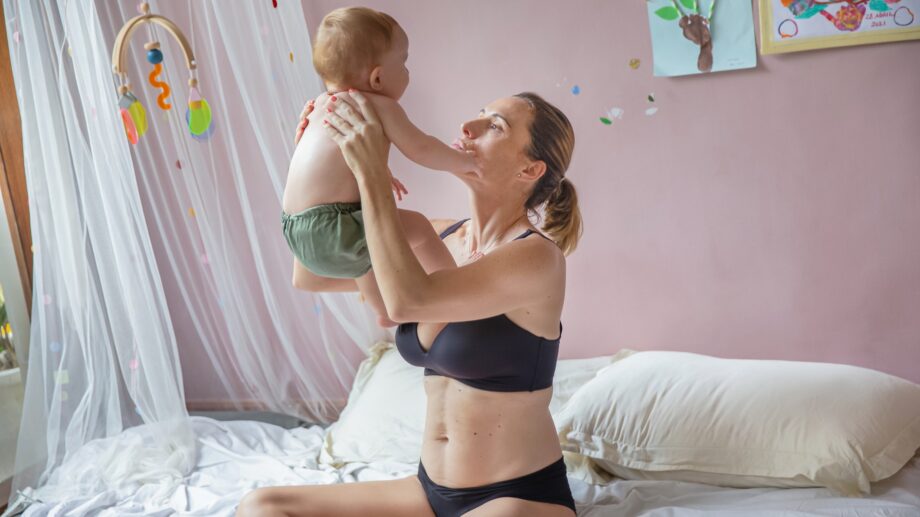Before she gave birth, Melissa loved wearing lingerie. Not just in the bedroom, but under her clothes, for herself. A red lace bralette made her feel powerful at work; a silky robe was her go-to on slow weekend mornings. She and her partner used to joke that Victoria’s Secret had nothing on her.
But after her baby was born, those pieces disappeared into the back of a drawer. At first, it was practical reasons—postpartum bleeding, nursing bras, exhaustion. But even after the physical recovery, Melissa found herself reaching for plain cotton, loose sweatshirts, and high-rise jeans that smoothed her silhouette. She caught herself hiding her cleavage when leaning over the stroller, tugging her shirt down while breastfeeding at the park.
It wasn’t just about physical comfort. It was a quiet shift, a tightening of who she was allowed to be now. Her partner noticed. Their sex life, once playful and frequent, had dwindled. Melissa said she was tired—and she was—but the truth ran deeper.
Somewhere between the baby monitor and the burp cloths, she’d absorbed another message she never meant to believe: Good mothers aren’t sexual. And sexual women? They don’t look like her anymore.
If you recognize yourself in Melissa’s story, it is because it illustrates a widespread belief: that sexuality and motherhood don’t belong together. New research by Christine E. Leistner, PhD, and Kristen P. Mark, PhD, suggests this idea may contribute to real changes in sexual functioning for both mothers and their partners. By examining attitudes toward mothers as sexual beings, the study reveals a hidden factor that could be influencing arousal, satisfaction, and desire in the early years of parenting.
Unpacking attitudes toward mothers as sexual beings

Having a first child is a major life change that often impacts intimacy and sexuality. Many new parents report sexual changes that persist well beyond the early postpartum months. Identity, body image, relationship dynamics, support systems, and cultural expectations around women and sex all play a role.
But until now, no studies have investigated whether attitudes toward mothers as sexual beings may also shape these struggles.
To explore this, researchers surveyed 475 parents—227 women and 248 men—who had their first child within the past five years.
The average age of participants was 34 years, ranging from 18 to 60. The majority identified as heterosexual (84%), White (64%), and were in monogamous relationships (96%).
To measure attitudes toward mothers as sexual beings, Leistner and Mark used an 11-item scale with two parts. The first part focused on how women’s sexuality relates to perceptions of mothering quality. For example, one item asked respondents to rate the statement: “Sexual women who are mothers are more likely to be,” with responses ranging from 1 (very ineffective mothers) to 7 (very effective mothers).
The second part addressed beliefs about mothers’ sexual interests and behaviors. An example item was, “Compared with women in general, sexual activity for women who are mothers is,” with responses ranging from 1 (much less important) to 7 (much more important).
Women’s sexual function was measured using an adapted version of the Female Sexual Function Index, which assessed desire, arousal, lubrication, orgasm, satisfaction, and pain. Men’s sexual function was measured using a modified version of the Expanded Prostate Cancer Index Composite–Short Form, covering orgasm, erectile function, sexual desire, overall sexual ability, and how problematic they found their sexual function. Both measures were adapted to focus on experiences since participants became sexually active with their current partner.
The power of sex-positive motherhood
Parents who held more positive attitudes toward mothers as sexual beings reported better sexual functioning across multiple domains. This link held even after accounting for age and relationship length.

Among mothers, positive attitudes were tied to better sexual functioning in all domains. The strongest associations were observed in arousal, followed by desire, lubrication, orgasm, satisfaction, and pain.
For male partners, positive attitudes were linked to higher functioning in every domain except self-reported sexual problems. The strongest association was with the ability to obtain an erection, followed by self-reported sexual functioning, ability to orgasm, as well as erection quality and frequency.
This pattern may reflect a dynamic within couples, where men’s views influence—or are influenced by—their partners’ sexual expression.
“Perhaps some of this is due to a partner effect given the research that has shown that women may change their behaviors to not appear as sexy and/or sexual when entering motherhood,” wrote the authors.
Challenging the good mother/sexual woman dichotomy
Motherhood and sexuality have long been cast as opposites, but this study shows that view may be doing real harm.
Negative attitudes about mothers as sexual beings were strongly linked to lower sexual functioning in both women and their male partners. By challenging these outdated norms, professionals may better support the sexual wellbeing of new parents. These findings also support earlier research suggesting that psychosocial factors play a bigger role in maternal sexual functioning than biological ones.
Future research should include more diverse populations, including non-White parents, whose experiences may be shaped by unique cultural stereotypes. Long-term studies examining partner influence, relationship conflict, and emotional distress may also provide valuable insights
The findings are a powerful reminder: embracing the sexual agency of mothers isn’t just progressive, it’s transformative.

This article was originally published on Le Shaw.





